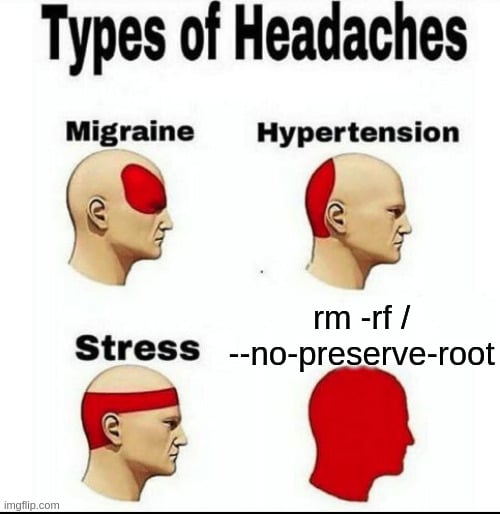this post was submitted on 22 Nov 2024
227 points (94.9% liked)
linuxmemes
21615 readers
366 users here now
Hint: :q!
Sister communities:
Community rules (click to expand)
1. Follow the site-wide rules
- Instance-wide TOS: https://legal.lemmy.world/tos/
- Lemmy code of conduct: https://join-lemmy.org/docs/code_of_conduct.html
2. Be civil
- Understand the difference between a joke and an insult.
- Do not harrass or attack members of the community for any reason.
- Leave remarks of "peasantry" to the PCMR community. If you dislike an OS/service/application, attack the thing you dislike, not the individuals who use it. Some people may not have a choice.
- Bigotry will not be tolerated.
- These rules are somewhat loosened when the subject is a public figure. Still, do not attack their person or incite harrassment.
3. Post Linux-related content
- Including Unix and BSD.
- Non-Linux content is acceptable as long as it makes a reference to Linux. For example, the poorly made mockery of
sudoin Windows. - No porn. Even if you watch it on a Linux machine.
4. No recent reposts
- Everybody uses Arch btw, can't quit Vim, and wants to interject for a moment. You can stop now.
Please report posts and comments that break these rules!
Important: never execute code or follow advice that you don't understand or can't verify, especially here. The word of the day is credibility. This is a meme community -- even the most helpful comments might just be shitposts that can damage your system. Be aware, be smart, don't fork-bomb your computer.
founded 2 years ago
MODERATORS
you are viewing a single comment's thread
view the rest of the comments
view the rest of the comments

Why doesn’t rm -rf /* also require —no-preserve-root? That seems just as easy to type accidentally and will just nuke your system without asking
It's actually harder to detect that. The
*is expanded before the arguments are sent torm, so it just sees a list of directories like/bin /usr /dev /sbin /homeand so on.You could implement logic to detect that case, but at that point you're just playing whackamole.
I believe zsh catches this and makes you confirm.
Well, that or one of my plugins, I'm not sure.
If you try to put in safeguards for every possible system-nuking command someone with root rights might type, you'll never get done.
When you're typing "rm -rf" as root, you should immediately stop and triple-check what you're doing.
Cause either there's a safer way to do what you want to do, or what you're trying isn't a good idea in the first place.
(Even when you want to delete lots of stuff in root space, a better way is to use
find. You can use it to look for and list the files you want to delete. After you've checked its output and verified that those are the correct files, just cursor-up to get the samefindquery again and add --delete at the end)Can confirm. Accidentally did that a few weeks ago.
I am curious how. If you were deleting everything in the local directory you wouldn't need the ./ before the asterisk, so was it some sort of piping that messed it up?
I was cleaning a usb and didn't want to reformat it.